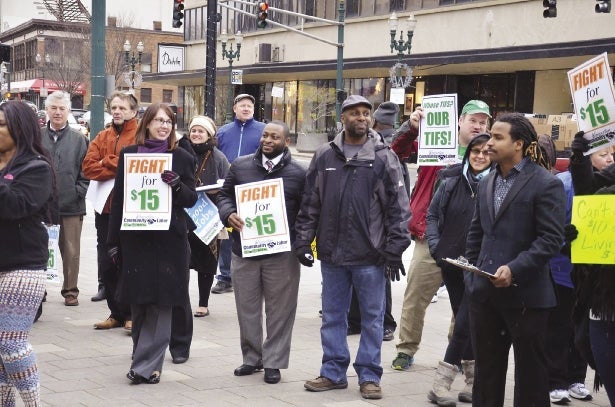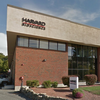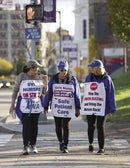Worcester's $15 symbolism battle
 PHOTO/COURTESY
Worcester residents rallied for a $15 minimum wage on Feb. 23. City councillors are looking into requiring businesses that use tax-increment financing to pay employees at least $15 an hour.
PHOTO/COURTESY
Worcester residents rallied for a $15 minimum wage on Feb. 23. City councillors are looking into requiring businesses that use tax-increment financing to pay employees at least $15 an hour.
It's happening in Los Angeles and New York state; it almost happened in Providence, and it could happen in Boston. Now, the national push for a $15 minimum wage has made its way to Worcester.
Labor advocates are pushing the Worcester City Council to update its requirements so any developments or businesses that receive special tax-increment financing (TIF) must pay their employees at least $15 an hour, which some say could help build enough momentum so that salary becomes the new minimum standard in the state and the country. On the other hand the city's business community and some city councillors said such a move is outside the city's responsibilities and would be an impediment to future development.
“If the council wants to put this requirement on a business owner, I would hope they'd be looking through and making sure city employees are within the same bounds,” said Stuart Loosemore, general counsel and director of government affairs and public policy at the Worcester Regional Chamber of Commerce.
Ultimately, the change – if made – would have little actual impact since it would only apply to employees of future TIF recipients. Current city TIF guidelines call for a $12.50 minimum wage on TIF recipients. However, labor activists and some councillors said higher wages are probably necessary to ensure the economic stability of residents over time.
The political battle, though, remains over the symbolism, as $15 per hour could give fuel to the nationwide minimum wage movement and/or serve as an example of the city's unfriendliness towards business.
“Economic development must be community development. Working to create jobs for residents of our community should be seen as part of an effective holistic development process, not as a restriction to economic development,” said Matt Feinstein, co-director of the Worcester Roots Project, a member of the Worcester Community Labor Coalition.
TIF implications
The higher minimum wage would only apply to people whose jobs were created because their company used TIFs as a development incentive. TIF projects are city-approved developments that receive an exemption on a portion of the new tax revenue they generate over the course of the agreement, which can last between five and 20 years. Companies can receive up to 100-percent exemption over the course of the plan, though the highest current exemption is 64 percent.
As of December 2015, there were 18 active TIF projects, eight of which began in the last five years, according to the city's Executive Office of Economic Development. Saint Vincent Hospital, the Hanover Insurance Group and Polar Beverages were all developed using TIF.
TIFs don't offer a tax break on what businesses currently pay, but they are an exemption on a portion of taxes of the increased value of a building after it is upgraded, Loosemore said. Imposing a minimum wage on developers would be outside the bounds of what TIFs were designed to do, since they're supposed to be a roadmap for developers, not a policy statement, he said.
“Some of the details that are beneficial to [a developer] may not be beneficial to [a different developer],” Loosemore said. “The manager should be allowed flexibility to negotiate deals on a case by case process.”
Whether or not it is a city's place to set its own minimum wage in Massachusetts remains to be seen, said Paul Sonn, general counsel and program director for the National Employment Law Project, a workers' advocacy organization based in New York City that is pushing for minimum wage increases nationwide.
Last year, State Sen. Daniel A. Wolf (D-Hyannis) filed a bill in the legislature asking that cities be allowed to set their own minimum wages higher than the state's.
“It hasn't been established [in Massachusetts] that cities can raise the minimum wage, but cities can establish higher wages for projects that get tax benefits. That's why many cities [nationwide] are adopting $15 wage for those types of workers,” Sonn said.
Setting the minimum wage is something states – not municipalities – should get to decide, Loosemore said.
The Fight for $15
The nationwide push for a $15-an-hour minimum wage started about three years ago, when fast food workers protested because they said they were unable to support themselves, Sonn said. Since then, officials in Los Angeles voted to raise that city's minimum wage to $15 an hour by 2020, and New York state became the first to raise wages to $15 an hour for fast food and state employees. Earlier this year, Boston Mayor Martin J. Walsh announced a task force assembled to figure out what a $15 minimum wage would mean for the capital city.
On Beacon Hill, several proposals related to the higher minimum wage are being considered, including an increase in wages for workers at fast food chains, big-box retail stores and service employees at Logan airport. Last year, the Bay State became the first in the nation to raise wages to $15 an hour for home healthcare workers, according to NELP. The statewide $10 an hour minimum wage is scheduled to go up by $1 to $11 per hour in January 2017.
The federal minimum wage is $7.25 per hour.
Unfriendly to business
City Councilman Tony Economou, who chairs the economic development subcommittee, said he was worried requiring a $15 minimum wage would send the wrong message to developers.
“If all of this goes out the window, we won't have to worry about giving everyone a TIF because there won't be anyone sitting on the other side of the table asking for one,” Economou said. “It's one of those, 'Be careful what you wish for' things because the goal is to attract business and create a sustainable community as you go forward.”
Councilwoman Sarai Rivera said Worcester needs to not be such a “cheap date” for developers, and that the city has a lot to offer besides tax breaks. She and Councillor George Russell both raised concerns the cost of living is already too high for some city residents.
According to the Economic Policy Institute's family budget calculator, a single worker with no children in Worcester needs to make $14.39 an hour in order to maintain a modest standard of living. Nearly 12 percent of Worcester's population lives below the poverty level, according to 2010-2014 American Community Survey estimates.
The city's economic development office is currently working on a report assessing the potential implications of a $15 minimum wage to be discussed at the next economic development subcommittee meeting on March 22.
“If the city of Worcester is going to give a tax break to a company, then we're going to ask them to provide jobs to folks to ask them to give a livable wage,” Russell said. “It's a reasonable request for us to get an answer from the administration for why this will or will not work.”













0 Comments